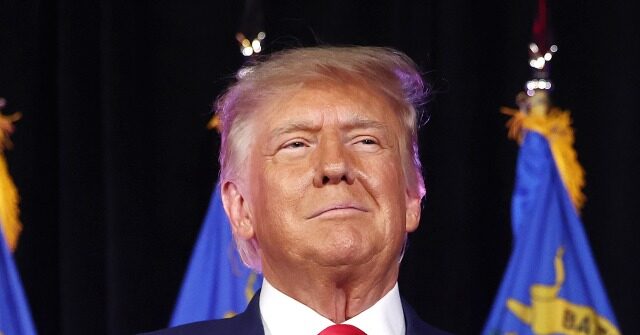
Supreme Court Justice Clarence Thomas questioned attorney Jason Murray, the lawyer representing Colorado voters before the Supreme Court, during oral arguments on Thursday surrounding Colorado’s decision to kick former President Donald Trump off the ballot under Section Three of the Fourteenth Amendment, or the “Insurrection Clause.”
While many U.S. Supreme Court justices expressed skepticism of the ability of a state — namely, Colorado — to kick off a presidential candidate from its ballot, Thomas zoned in on this, particularly, during a Q&A with Murray, the latter of whom argued that states have the authority to disqualify national candidates. However, when asked for examples from Thomas, Murray was unable to provide any.
Murray stated that states have the power to run elections, but Thomas quickly offered a counterpoint.
“But would seem that — particularly after Reconstruction and after the Compromise of 1877 and during the period of Redeemers — that you would have that kind of conflict. There were a plethora of Confederates still around. There were any number of people who would continue to either run for state offices or national offices,” Thomas said, adding that this reality would “suggest that there would at least be a few examples of national candidates being disqualified.”
“Well, there were certainly national candidates who are disqualified by Congress refusing to seat them,” Murray responded. But Thomas pointed out that it is “not this case.”
“Other than the example I gave, no,” Murray admitted, adding that it was not surprising.
“What was the purpose of Section Three? States were sending people — the concern was that the former Confederate states would continue being bad actors,” Thomas said.
“And the effort was to prevent them from doing this and you’re saying that well, this also authorized states to disqualify candidates. So what I’m asking you for, if you are right, what are the examples?” Thomas asked again.
“Your Honor, the examples are states excluded many candidates for state office, individuals holding state offices. We have a number of published cases of states,” Murray responded before Thomas interjected.
“I understand the states controlling state elections and state positions. What we are talking about here are national candidates,” Thomas said, noting that there were people who “felt very strongly about retaliating against the South, the Radical Republicans, but they did not think about authorizing the South to disqualify national candidates, and that’s the argument you’re making.”
LISTEN:
Supreme Court Justice Clarence Thomas EVICERATES Colorado attorney Jason Murray during Donald Trump’s 14th Amendment hearing at SCOTUS.
Thomas – “What are the examples?”
Murray – Provides no examples.
Thomas – “Do you have any examples of this?”
Murray – Still no examples. pic.twitter.com/fkiRvkKnvb
— Conservative Brief (@ConservBrief) February 8, 2024
“And what I would like to know is, do you have any examples of this?” Thomas asked yet again.
Once again, Murray was unable to provide any examples:
I think the reason why there aren’t examples of states doing this is an idiosyncratic one of the fact that elections work differently back then, states have a background power under Article II and the Tenth Amendment to run presidential elections. They didn’t use that power to police ballot access until about the 1890s. And by the 1890s, everyone had received amnesty and these issues have become moot.
Chief Justice John Roberts then weighed in:
Look at Justice Thomas’s questions sort of from the 30,000 foot level. I mean, the whole point of the Fourteenth Amendment was to restrict state power. Right? States shall not abridge privileges or immunities. They won’t deprive people of property without due process, and they won’t deny equal protection. On the other hand, it augmented federal power under Section Five. Congress has the power to enforce it. So wouldn’t that be the last place that you’d look for authorization for the states, including Confederate states, to enforce implicitly authorized to enforce the presidential election process?
“That seems to be a position that is at war with the whole thrust of the Fourteenth Amendment and very ahistorical,” Roberts added.
The case is Trump v. Anderson, No. 23-719 in the Supreme Court of the United States.
